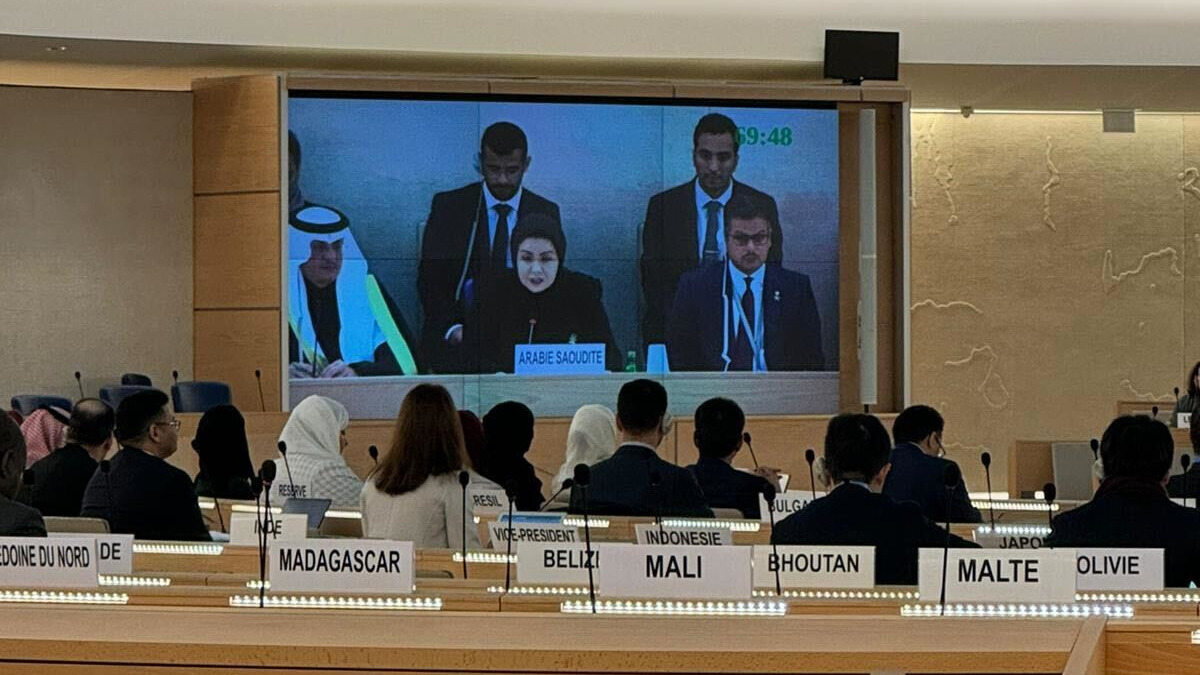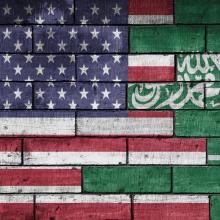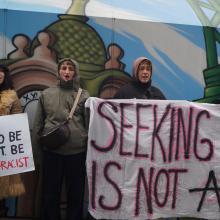January 31, 2024

Ms. Hala al-Tuwaijri, President of the Saudi Human Rights Commission, speaks on behalf of the Saudi delegation during the Universal Periodic Review at the UN Human Rights Council.
On January 22, 2024, Saudi Arabia’s human rights record was examined before the UN Human Rights Council (HRC) during the country’s fourth Universal Periodic Review (UPR). The UPR is a peer-review mechanism by which UN Member States make recommendations to the country under review on how to improve its human rights record in light of the country’s international obligations.
Saudi Arabia is then required to notify the HRC of the recommendations it wishes to accept and those it rejects during the upcoming 56th session of the HRC in June-July 2024. Ahead of the review, MENA Rights Group submitted a shadow report, containing a list of recommendations, which was circulated among the reviewing states. Prior to the Kingdom’s UPR, MENA Rights Group presented the findings of the report during a pre-session held by the Geneva-based organisation UPR-Info.
While conducting the UPR for the fourth time, the Saudi delegation claimed that they implemented 80% of the recommendations made during its third UPR, a statement that lacks any substantiated proof.
Saudi Human Rights Commission
During its fourth UPR session, the President of the Saudi Human Rights Commission (SHRC), Ms. Hala al-Tuwaijri, chaired as the head of the Saudi Delegation, which included numerous members of the SHRC. A report by MENA Rights Group highlights that Saudi’s National Human Rights Institution (NHRI) essentially functions as a tool for whitewashing the Kingdom’s image. Saudi Arabia’s NHRI, i.e. the SHRC, should be fully independent from the Saudi government. However, the SHRC acted as an extension of the government by heading the Saudi delegation at the UPR. This underscores the evident lack of independence of the Commission.
While the session was unfolding, Chile made a recommendation in this regard to Saudi Arabia, asking the Kingdom to “take steps to ensure that the National Human Rights Commission fully complies with the Paris Principles”.
Freedom of expression
In its introductory remarks, the President of the SHRC claimed that freedom of opinion and expression are guaranteed in Saudi’s Basic Law and that any claims made by individuals regarding a restriction of their right are duly examined in courts and by the SHRC itself. She added if there should be restrictions on the media, it is only for the purpose of “maintaining public order”.
In practice, MENA Rights Group found that the authorities are given considerable powers to regulate and determine what speech is considered to “harm the state’s security”. For instance, the Anti-Cyber Crime Law and the Counter-Terrorism Law have been used as the main legal basis to arbitrarily arrest and detain peaceful social media critics during the last decade.
In light of this situation, 21 countries have issued recommendations for Saudi Arabia to protect the right to freedom of expression. Ghana for example recommended that Saudi Arabia “enhances its efforts to promote freedom of opinion and expression, both online and offline, in accordance with international human rights law.”
Other countries made specific recommendations on the need to reform the Anti-Cyber Crime Law. Switzerland recommended that Saudi Arabia “amends the Basic Law, […] and the Anti-Cyber Crime Law to bring them into line with international standards on the right to freedom of expression.” In a similar vein, New Zealand recommended that Saudi Arabia “ensures the use of social media for peaceful expression is not criminalised.”
Counter-terrorism framework
One of Saudi Arabia’s major impediments on human rights is its counter-terrorism legislative framework, which the Saudi delegation did not address during its UPR. The Kingdom adopted its Law on Combating Crimes of Terrorism and its Financing in 2017, which criminalises several acts that fall under the protection of freedom of expression, peaceful assembly, and association according to civil society findings. Hence, Saudi authorities have consistently used counter-terrorism legislation to sentence peaceful human rights defenders and political dissidents to lengthy prison sentences and death penalties, including women human rights defenders.
During its UPR, Saudi Arabia received 11 recommendations to amend its domestic counter-terrorism framework. Norway recommended that Saudi Arabia “ensures that the counter-terrorism legislation complies with international human rights standards so as not to criminalize peaceful exercise of freedom of expression, assembly, and association.” In a similar vein, Austria recommended that Saudi Arabia amends “the definition of terrorism in the counter-terrorism legislation.”
Additionally, the United Kingdom recommended that Saudi authorities “restrict the use of the Specialised Criminal Court to cases that are appropriately defined as terrorism and permit journalists and diplomats to routinely monitor such trials”.
Prohibition of torture and death penalty
During the session, Saudi Arabia’s delegation stated that torture is strictly prohibited in the Kingdom and that anyone who is involved in acts of torture faces a sentence of at least 10 years’ imprisonment. The Saudi authorities also assured that the country fully respects international standards with regards to the death penalty and asserted that its use on minors has been repealed.
In practice however, torture is widespread in the country and is regularly used against human rights defenders and peaceful dissidents, including to extort forced confessions and use them in court as sole evidence for their conviction. Claims made by victims have never been investigated but rather covered up by the SHRC. Furthermore, despite their promises, Saudi authorities are still using the death penalty against individuals who committed crimes as minors. There are currently at least nine such individuals on death row and two who are at imminent risk of execution.
In light of this, Saudi Arabia received 15 recommendations relating to the prohibition of torture. Costa Rica recommended that the country “independently and effectively investigate allegations of torture and ill-treatment”, whereas Togo recommended that Saudi Arabia “include the crime of torture, as defined in Article 1 of the UNCAT, in the country’s penal provisions.” Other countries, such as Croatia, recommended that the country “ratify the Optional Protocol to the UNCAT.”
Furthermore, the Kingdom received 35 recommendations regarding the abolition of the death penalty. Argentina for instance recommended that Saudi Arabia “expressly prohibit the sentencing of minors to the death penalty” while Paraguay and several other countries recommended that the authorities “declare an official moratorium with a view to definitely abolishing the death penalty.”
Next steps
Saudi Arabia has until the 56th session of the Human Rights Council – which will be held from June 18 to July 12, 2024 – to provide responses to the recommendations it received during its UPR. Saudi Arabia will commit to implementing accepted recommendations ahead of the country’s 5th cycle.
We urge Saudi Arabia to accept the recommendations made by UN Member States, especially those pertaining to fundamental rights, the prohibition of torture and the abolition of the death penalty, as well as the recommendations regarding the amendment of its counter-terrorism framework.






